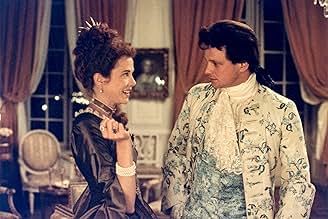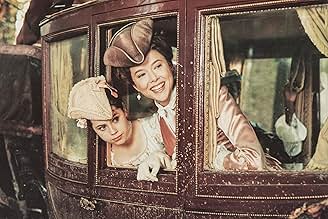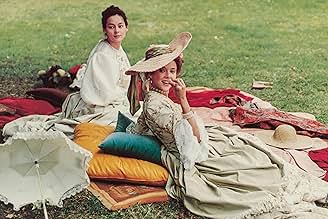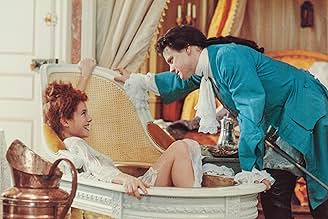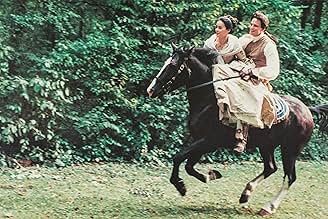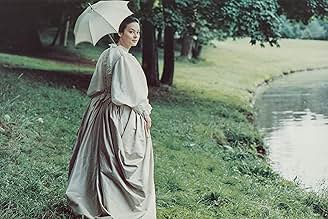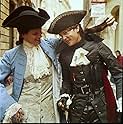VALUTAZIONE IMDb
7,0/10
14.946
LA TUA VALUTAZIONE
Francia prima del 1789, quando una vedova viene a sapere che il suo amante sta per sposare la figlia di sua cugina, chiede al playboy Valmont di prendersi la verginità della ragazza.Francia prima del 1789, quando una vedova viene a sapere che il suo amante sta per sposare la figlia di sua cugina, chiede al playboy Valmont di prendersi la verginità della ragazza.Francia prima del 1789, quando una vedova viene a sapere che il suo amante sta per sposare la figlia di sua cugina, chiede al playboy Valmont di prendersi la verginità della ragazza.
- Regia
- Sceneggiatura
- Star
- Candidato a 1 Oscar
- 3 vittorie e 5 candidature totali
Siân Phillips
- Madame de Volanges
- (as Sian Phillips)
Sébastien Floche
- Priest
- (as Sebastien Floche)
Recensioni in evidenza
I liked this better than Dangerous Liaisons which came out at about the same time. Of course Dangerous Liaisons was very good, and John Malkovich, who played Vicomte de Valmont, is an actor of power, and Glenn Close, who played the Marquise de Merteuil, is highly accomplished, but I preferred the charm of Colin Firth in this film to the brutality of Malkovich, and I thought Annette Bening was just delightful. She played Merteuil with exquisite timing and an ironic witchery and warmth that I shall not soon forget. I preferred her playful, sly wit to Close's cool cynicism.
The story comes from a novel by Choderlos de Laclos set in 18th century France that was made into a stage play by Christopher Hampton. It is a cynical satire on human sexuality as well as a very subtle examination of sexual hypocrisy and desire, a kind of oh so sophisticated laugh at bourgeois morality that would have delighted Voltaire and Moliere and greatly amused Shakespeare. It is a tale of elaborate lechery and revenge that backfires because it seems that anybody, even the most jagged rake can fall in love, and thereby become the victim. The central assumption here is the same as that of the Cavalier poets, namely that marriage kills love. As Merteuil says, "You don't marry your lover."
Meg Tilly played Madame de Tourvel with subtlety and a riveting passion. One of the great sequences in the movie occurs after she has fallen madly in love with Valmont against her will. She stands outside his doorway in the rain for hours looking adoringly and forlornly up at his window. And then she is allowed to enter and receive a cool reception. Valmont says, "Do you want me to lie to you?" and she replies desperately, "Yes," and then it is her passion that overwhelms him, leading to a beautifully ironic twist. Shortly afterward he sees Merteuil, who has become more like a sister than an ex-lover, and says, "I feel awful." She replies, "Are you surprised? (Pause) You are an awful man." Hanging his head he continues, "Do you think a man can change?" "Yes. (Pause) For the worse."
This theme, that it is the beloved who has the power and that once you fall in love you lose all power, is repeated several times in the movie. Valmont pursues women, the harder to get the better, with a relentless and maniacal passion, but once he has them, he immediately loses interest. His making love absentmindedly to Cecile de Volanges (played with wide-eyed innocence and girlish charm by Fairuza Balk) was an incredible irony when we consider what she would cost Gercourt, played with his rather substantial nose in the air by Jeffrey Jones, whom you may recall as the pratfalling principal in Ferris Bueller's Day Off (1986).
There is some insidious philosophy here, some sardonic observations on human nature worth mentioning. One is that the man beloved of women gets most of the reproductive tries, and regardless of his rakishness, is still beloved. Another is that duplicity is the accepted, even required, standard of behavior in society, and that when it comes to sex, one must, perforce, always lie.
Milos Forman's direction was invisible and therefore a work of art. The incidental scenes and backdrops depicting the color, squalor and decadence of pre-revolutionary France added just the right amount of atmosphere. The costumes were stunning and much cleaner than they would have been in reality. The elegance and beauty of all the titled people merrily contrasted with the crude ugliness of the common people, rightly reflecting the effete snobbery of the aristocracy before the time of the guillotine.
(Note: Over 500 of my movie reviews are now available in my book "Cut to the Chaise Lounge or I Can't Believe I Swallowed the Remote!" Get it at Amazon!)
The story comes from a novel by Choderlos de Laclos set in 18th century France that was made into a stage play by Christopher Hampton. It is a cynical satire on human sexuality as well as a very subtle examination of sexual hypocrisy and desire, a kind of oh so sophisticated laugh at bourgeois morality that would have delighted Voltaire and Moliere and greatly amused Shakespeare. It is a tale of elaborate lechery and revenge that backfires because it seems that anybody, even the most jagged rake can fall in love, and thereby become the victim. The central assumption here is the same as that of the Cavalier poets, namely that marriage kills love. As Merteuil says, "You don't marry your lover."
Meg Tilly played Madame de Tourvel with subtlety and a riveting passion. One of the great sequences in the movie occurs after she has fallen madly in love with Valmont against her will. She stands outside his doorway in the rain for hours looking adoringly and forlornly up at his window. And then she is allowed to enter and receive a cool reception. Valmont says, "Do you want me to lie to you?" and she replies desperately, "Yes," and then it is her passion that overwhelms him, leading to a beautifully ironic twist. Shortly afterward he sees Merteuil, who has become more like a sister than an ex-lover, and says, "I feel awful." She replies, "Are you surprised? (Pause) You are an awful man." Hanging his head he continues, "Do you think a man can change?" "Yes. (Pause) For the worse."
This theme, that it is the beloved who has the power and that once you fall in love you lose all power, is repeated several times in the movie. Valmont pursues women, the harder to get the better, with a relentless and maniacal passion, but once he has them, he immediately loses interest. His making love absentmindedly to Cecile de Volanges (played with wide-eyed innocence and girlish charm by Fairuza Balk) was an incredible irony when we consider what she would cost Gercourt, played with his rather substantial nose in the air by Jeffrey Jones, whom you may recall as the pratfalling principal in Ferris Bueller's Day Off (1986).
There is some insidious philosophy here, some sardonic observations on human nature worth mentioning. One is that the man beloved of women gets most of the reproductive tries, and regardless of his rakishness, is still beloved. Another is that duplicity is the accepted, even required, standard of behavior in society, and that when it comes to sex, one must, perforce, always lie.
Milos Forman's direction was invisible and therefore a work of art. The incidental scenes and backdrops depicting the color, squalor and decadence of pre-revolutionary France added just the right amount of atmosphere. The costumes were stunning and much cleaner than they would have been in reality. The elegance and beauty of all the titled people merrily contrasted with the crude ugliness of the common people, rightly reflecting the effete snobbery of the aristocracy before the time of the guillotine.
(Note: Over 500 of my movie reviews are now available in my book "Cut to the Chaise Lounge or I Can't Believe I Swallowed the Remote!" Get it at Amazon!)
Milos Forman's Valmont is ultimately no better and no worse an adaptation of Les Liaisons Dangereuse than Dangerous Liaisons by Stephen Frears which made it into theaters months earlier. Both are entertaining, yet both dip into tedium around the three-quarter point because the web of aristocratic intrigues they are following gets too tangled for a two-hour screen treatment.
"Valmont" occupies a wider canvas which encompasses visual reminders that the privileged central characters live amidst a largely impoverished society. As soon as horse-drawn carriage gallops away from palace or mansion, the squalid reality of the streets of Paris is revealed. Frears's "DL" is able to show the same difference by closing in on relationships such as the intimate master-servant morning rituals that open his film. Forman's "Valmont" humanizes the main characters by toning down their cruelty and blunting their extremes. By contrast, in "DL" Glenn Close plays the Comtesse de Merteuil with a cold reserve that dissolves into hysteria whereas Annette Bening in "V" exudes a high-wattage, tightly controlled gaiety which remains more or less constant throughout. Colin Firth's Valmont is more dashing and virile than John Malkovich's, but his performance lacks the corrupt menace which Malkovich provides in overly strong doses. Firth's seduction of the young Cecile (Fairuza Balk), is brilliantly conceived, staged and performed. Meg Tilly as Mme. De Tourvel has a simplicity and vulnerability that eluded Michelle Pfeiffer in DL, and Tilly doesn't strain for effects. She and Firth are also a better physical match, and the development of their relationship makes more sense here. Henry Thomas as the music tutor in love with young Cecile has much more screen time than Keanu Reeves in DL, which is all for the better because he has the acting chops to pull it off – a 17-year-old with more principles and purity than all of the adults in his orbit combined. Whereas "Valmont" is a diffuse and leisurely satire, DL is a highly stylized tragedy.
"Valmont" occupies a wider canvas which encompasses visual reminders that the privileged central characters live amidst a largely impoverished society. As soon as horse-drawn carriage gallops away from palace or mansion, the squalid reality of the streets of Paris is revealed. Frears's "DL" is able to show the same difference by closing in on relationships such as the intimate master-servant morning rituals that open his film. Forman's "Valmont" humanizes the main characters by toning down their cruelty and blunting their extremes. By contrast, in "DL" Glenn Close plays the Comtesse de Merteuil with a cold reserve that dissolves into hysteria whereas Annette Bening in "V" exudes a high-wattage, tightly controlled gaiety which remains more or less constant throughout. Colin Firth's Valmont is more dashing and virile than John Malkovich's, but his performance lacks the corrupt menace which Malkovich provides in overly strong doses. Firth's seduction of the young Cecile (Fairuza Balk), is brilliantly conceived, staged and performed. Meg Tilly as Mme. De Tourvel has a simplicity and vulnerability that eluded Michelle Pfeiffer in DL, and Tilly doesn't strain for effects. She and Firth are also a better physical match, and the development of their relationship makes more sense here. Henry Thomas as the music tutor in love with young Cecile has much more screen time than Keanu Reeves in DL, which is all for the better because he has the acting chops to pull it off – a 17-year-old with more principles and purity than all of the adults in his orbit combined. Whereas "Valmont" is a diffuse and leisurely satire, DL is a highly stylized tragedy.
I must confess that the first time I saw that movie, few years after it's release, I couldn't help, but find it a pale version of Stefan Freirs "Dangerous Liaison". Recently I have seen both movies and I must say that my opinion is quite the opposite now. In "Valmont" everything is subtle and I think this is why most people didn't get it. You can destroy someone's life without having written "I'm Bad!" on your forehead. With her slow-velvet voice Annette Bening is a snake under a rock:she is terrifying. As for Colin Firth's Valmont he is charming, he flies like a butterfly, but he knows exactly what he is doing. We believe in his seduction not because we are told to but because we are seduced ourselves. People have been saying that Valmont was too light, too boyish. There is nothing boyish in the way he says at Mme de Tourvelle "Is that what you want?" You see at that point how his hight-pitched voice, that goes with his voice and smile, is only a mask, as powder was John Malkovitch's mask. Colin Firth said that Milos Forman was too subtle for his own good and I think this is why some people can still find "Dangerous Liaisons" more powerful. As for "Valmont" even if the end is a bit weak, I wouldn't hesitate to say that it is from far the best version of the two movies. For those who go by the book, as I once did, you might be puzzled by the differences with the original story but for its deep sensitivity, its wonderful cast and this art of subtlety, it's really worth every moment of it.
"Valmont" is a 1989 film based on the novel Les Liaisons Dangereuses by Choderlos de Laclos, as well, of course, the better-known film Dangerous Liaisons starring Glenn Close and John Malkovich.
Here, Annette Benning is the Merteuil who is stunned to learn that her lover, Gercourt (Jeffrey Jones) is betrothed to the fifteen-year-old virginal Cecile (Fairuza Balk). She makes a bet with her Casanova-like friend Valmont (Colin Firth) that he can seduce Cecile so that on her wedding night, she is not a virgin, thus giving Merteuil revenge against Gercourt. Of course, the best-laid plans and all that - Cecile is in love with her music teacher (Henry Thomas), and Merteuil aids and abets the romance as much as possible. But things become more and more complicated, with Valmont, the eternal playboy, actually falling in love himself. And as the story says, once you fall in love, your power is gone.
This film is far superior to the more famous one. Forman is a fantastic director, and the cast warms up what is basically a cold, calculated story and really makes you care.
Annette Bening is more full-dimensional than Close's Martueil - she's beautiful, smart, and she's so sweet and lies so beautifully one has no idea what she's really like. Firth's Valmont is far more believable than Malkoitch's egomaniacal portrayal.
Henry Thomas is the desperately in love music teacher - it's good casting, but he comes off as too modern. It's a minor point because the entire cast is wonderful, including Fabia Drake as Madame de Rosemond, Sian Philips, Meg Tilly, and Fairuza Balik.
The film is beautiful to look at, sumptuously and carefully produced. It's a sad case of being the second film version out when the first was better marketed with a more American cast. Nevertheless, it's not too late to discover this gem.
Here, Annette Benning is the Merteuil who is stunned to learn that her lover, Gercourt (Jeffrey Jones) is betrothed to the fifteen-year-old virginal Cecile (Fairuza Balk). She makes a bet with her Casanova-like friend Valmont (Colin Firth) that he can seduce Cecile so that on her wedding night, she is not a virgin, thus giving Merteuil revenge against Gercourt. Of course, the best-laid plans and all that - Cecile is in love with her music teacher (Henry Thomas), and Merteuil aids and abets the romance as much as possible. But things become more and more complicated, with Valmont, the eternal playboy, actually falling in love himself. And as the story says, once you fall in love, your power is gone.
This film is far superior to the more famous one. Forman is a fantastic director, and the cast warms up what is basically a cold, calculated story and really makes you care.
Annette Bening is more full-dimensional than Close's Martueil - she's beautiful, smart, and she's so sweet and lies so beautifully one has no idea what she's really like. Firth's Valmont is far more believable than Malkoitch's egomaniacal portrayal.
Henry Thomas is the desperately in love music teacher - it's good casting, but he comes off as too modern. It's a minor point because the entire cast is wonderful, including Fabia Drake as Madame de Rosemond, Sian Philips, Meg Tilly, and Fairuza Balik.
The film is beautiful to look at, sumptuously and carefully produced. It's a sad case of being the second film version out when the first was better marketed with a more American cast. Nevertheless, it's not too late to discover this gem.
I just watched "Valmont" just now actually, and what can I say, I was really impressed with the film... I've seen "Dangerous Liason" so many times before, and it's always been one of my favorites, so maybe that's why I was a bit skeptical about "Valmont" as it started (for me it was overshadowed by "Dangerous Liason", but it was quick for me to be proven wrong...) The film was great, very interesting, because it provided different insight into the the story. Colin Firth (who I've fallen in love with ever since I watched "Bridget Jones' Diary, because he is one charming brit!) was dazzling as Valmont, and he managed to display another kind of Valmont, which John Malkovich wasn't, but he was great as well. Firth's Valmont was very charming and he has a passion and charisma to him that Malkovich lacked (he was overall rather "cool"), and what can i say? He just took my breath away again once again. Annette Bening (is that how u spell her name?) was also brilliant, and in the begining I was tricked into thinking that she was too nice for the part, but nope, she was evil as well, and maybe to some extent more evil that Glenn Close's portryal, because beneath all the nice and sweetness, beining was evil indeed! and Henry Thomas, he was extroidinary, and he did a great job! His potrayal of his character was so much better than Keanu Reeves (who can't act), and he made the movie interesting indeed. it was sad to see his innocence lost at the end though, what really disturbed me, because before he was such a loyal lover! sad, the loss of innocence, once it's gone, it never comes back...maybe "Valmont" is lacking in the sense that it failed to illustrate the importance of Madame de Tourvel, like "Dangerous Liason" did, but otherwise, Valmont is magnificent. passionate, fun, and definetly keeps you going!
Lo sapevi?
- QuizMeg Tilly and Colin Firth fell in love while they were making the film. A year later they had a son together.
- BlooperWhen Tourvel is in the market, she places several food items in her basket one after the other. However, every time she does so, the basket appears empty even though she had just placed something in it a moment before.
- Colonne sonoreDivertimento for Winds in B Flat Major, K240
Wolfgang Amadeus Mozart
Performed by the orchestra of the The Academy of St. Martin-in-the-Fields
I più visti
Accedi per valutare e creare un elenco di titoli salvati per ottenere consigli personalizzati
- How long is Valmont?Powered by Alexa
Dettagli
- Data di uscita
- Paesi di origine
- Lingua
- Celebre anche come
- Valmont. Relaciones peligrosas
- Luoghi delle riprese
- Château de la Motte-Tilly, Nogent-sur-Seine, Aube, Francia(Madame de Rosemonde's estate)
- Aziende produttrici
- Vedi altri crediti dell’azienda su IMDbPro
Botteghino
- Budget
- 33.000.000 USD (previsto)
- Lordo Stati Uniti e Canada
- 1.132.112 USD
- Fine settimana di apertura Stati Uniti e Canada
- 96.008 USD
- 19 nov 1989
- Lordo in tutto il mondo
- 1.132.112 USD
- Tempo di esecuzione2 ore 17 minuti
- Colore
- Proporzioni
- 2.39 : 1
Contribuisci a questa pagina
Suggerisci una modifica o aggiungi i contenuti mancanti







